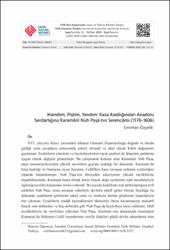Hamdım, Piştim, Yandım: Kaza Kadılığından Anadolu Serdarlığına Karamânî Nuh Paşa’nın Serencâmı (1576-1606)
Künye
ÖZÇELİK, Emirhan. "Hamdım, Piştim, Yandım: Kaza Kadılığından Anadolu Serdarlığına Karamânî Nuh Paşa’nın Serencâmı (1576-1606)". FSM İlmî Araştırmalar İnsan ve Toplum Bilimleri Dergisi, 22 (2023): 119-151.Özet
XVI. yüzyılın ikinci yarısından itibaren Osmanlı İmparatorluğu doğuda ve batıda
girdiği uzun savaşların neticesinde askerî, iktisadî ve idarî olarak köklü değişimler
geçirmişti. Eyaletlerin yönetimi ve beylerbeylerinin tayin usulleri de dönemin şartlarına
uygun olarak değişim göstermişti. Bu çalışmanın konusu olan Karamânî Nuh Paşa,
taşra memuriyetlerinden yüksek mevkilere geçişin azaldığı bir dönemde, Karaman’da
kaza kadılığı ile başlayan siyasi hayatını, Celâlîlere karşı savaşan ordunun serdarlığını
yaparak tamamlamıştı. Nuh Paşa’nın ilmiyeden askeriyenin yüksek mevkilerine
ulaşabilmesinde, Karaman başta olmak üzere birçok doğu eyaletinin malî meseleleriyle
ilgilenip tecrübe kazanması birinci etkendi. Bu sayede kadılıktan mal defterdarlığına terfi
edebilen Nuh Paşa, uzun savaşlar sebebiyle devletin nakdî gelire ihtiyaç duyduğu bu
dönemde eyaletlerin gelirlerini tahsil etme ve merkeze hazine gönderme başarılarıyla
öne çıkmıştı. Eyaletlerin maddî kaynaklarının idaresinin önem kazanmasına mukabil
birçok mal defterdarı ve baş-defterdar gibi Nuh Paşa da beylerbeyi tayin edilmişti. Malî
tecrübeleriyle bu mevkilere yükselen Nuh Paşa, ömrünün son döneminde memleketi
Karaman’da fitillenen Celâlî isyanlarının yerelle ilişkileri güçlü devlet adamlarına olan ihtiyacının etkisiyle kalemiyeden seyfiyeye geçiş yapmıştı. Böylece eyalet muhafızlığı,
Karaman beylerbeyi payesiyle Habsburg seferlerine katılmış ve en sonunda Celâlîlerle
savaşan ordunun serdarlığıyla başarılı bir askerî kariyere de sahip olabilmişti. Since the second half of the sixteenth century, the Ottoman Empire has undergone
radical changes in terms of military, economic and administration as a result of the long
wars in the East and West. The administration of the provinces and the procedures for the
appointment of governors also changed in accordance with the conditions of the period.
Karamanlı Nuh Pasha, the subject of this study, had begun his political career as a district
judge in Karaman, at a time when the transition from provincial civil servants to high
positions was decreasing, completed it by serving as the commander of the army fighting
against the Jalalis. The primary factor in Nuh Pasha’s ability to reach high positions,
contrary to the general trend, was that he dealt with the financial issues of many eastern
provinces, especially Karaman, and gained the utmost experience. As a financial director,
Nuh Pasha came to the fore with his success in collecting the revenues of the provinces
and sending treasury to the center in that period when the state needed cash income due to
long wars. In response to the importance of the administration of the financial resources of
the provinces, Nuh Pasha was appointed as a governor, like many other financial directors
of the provinces and chief record keepers. In the second part of his political career, Nuh
Pasha switched from pen to sword due to the need for statesmen with strong relations
with the locality in the process of fighting against the Jalalis. Thus, he was able to have a
successful military career as a provincial guard, participating in the Habsburg campaigns
with the rank of the governor of Karaman, and finally serving as the commander of the
army fighting the Jalalis.
Kaynak
FSM İlmî Araştırmalar İnsan ve Toplum Bilimleri DergisiSayı
22Bağlantı
https://dergipark.org.tr/tr/pub/fsmia/issue/81557/1408461https://hdl.handle.net/11352/4696



















